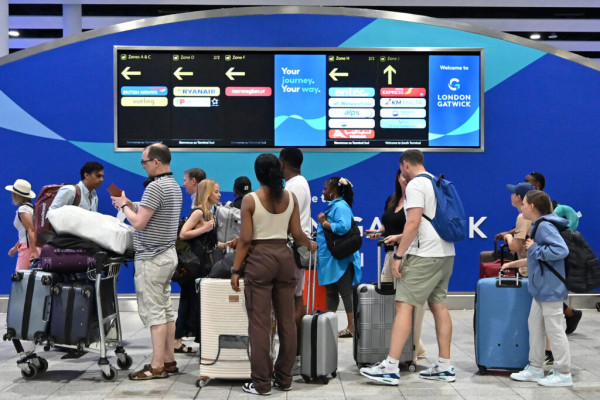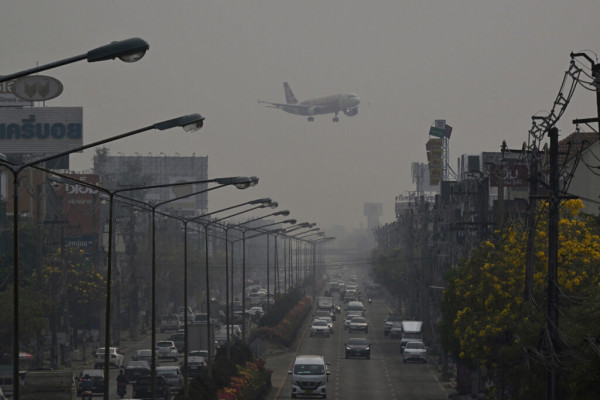NGOs in a dogfight with airlines over ‘grotesque and stupid’ cheap flying schemes
BRUSSELS — Airlines are coming up with ever more inventive schemes to get bums into their seats — and that's a nightmare for campaigners keen to slash flights to combat climate change.
The latest idea landed last Tuesday, when Hungarian low-cost airline Wizz Air announced its “All you can fly” membership at a temporary price of €499 (rising to €599 from Friday), which unlocks the right to fly for one year at €9.99 per flight.
Climate activists are underwhelmed.
“Unlike what some may think, flying is not an all-you-can-eat buffet,” complained Jo Dardenne, aviation director at green NGO Transport & Environment.
“How can airlines’ commitments to climate neutrality be taken seriously when they continue to push unsustainable traffic growth by offering dubious cheap schemes for flying on polluting jets?” she asked.
Alethea Warrington, senior campaigner at the climate charity Possible, called the new Wizz Air scheme: “utterly grotesque and deeply stupid.”
Other airlines like Ryanair are filling seats with flash sales, while legacy carriers are also using loyalty programs to keep people flying.
“It’s concerning that no government has taken steps to ban frequent flyer reward programs,” Warrington added.
But Wizz Air insists that flying with full airplanes is good for the environment by reducing the carbon footprint of each individual passenger.
The “All you can fly” scheme “contributes to maximizing the load factor during the last 72 hours before the flight. High load factor is a crucial efficiency driver and leads to reduction in emission intensity,” said Tamara Nikiforova, senior communications manager for Wizz Air.
The carrier says it's also doing other things to lessen the environmental impact of flying.
Wizz Air will “continue investing into the best fuel-efficient technology, maintaining young fleet age, operating point-to-point flights” to achieve its goal of “further reducing our CO2 emissions per passenger/km by 25 percent by 2030,” the spokesperson added.
Although most European airlines have set medium- and long-term targets to reduce their emissions, green activists remain skeptical about the sector's willingness to prioritize decarbonization over profits.
Fear of flying
Aviation accounts for about 2.5 percent of global CO2 emissions, but the U.N.'s International Civil Aviation Organization forecast that aircraft pollution could triple by 2050 from 2015 levels. That’s why the sector is under pressure to slash its impact on the climate.
Last year, the Possible NGO assessed emissions associated with different frequent flyer programs offered by British Airways and Virgin Atlantic, and found that qualifying for membership “requires emissions between 7 and 112 times higher than the average U.K. air travel footprint.”

Possible also estimated that a “Gold Status” with Virgin Atlantic or British Airways means taking flights that emit an average of 27 tons of CO2e (carbon dioxide equivalent) per year, over 33 times higher than the average U.K. individual air travel footprint.
In particular, the NGO put the blame for emissions on the 15 percent of Britons who take 70 percent of the U.K.'s flights, while about half the population does not fly at all.
The global per capita distribution of aviation emissions was assessed in a 2020 study, which found that 1 percent of the world's population emits 50 percent of the CO2 from commercial aviation.
“Frequent flyer programs are fueling aviation’s unsustainable growth, giving some flyers a false sense of reality that we don’t live in a climate crisis,” Dardenne said.
Green organizations are also mad at airlines offering cheap flights, pushing people away from more sustainable modes of transportation like trains.
Ryanair doesn't have a frequent flier program, but does hold frequent 24-hour flash sales on top of its usual cut-rate fares.

“If you want something loyal, buy a dog. If you want the lowest air fares in Europe, fly Ryanair,” Michael O'Leary, CEO of the Irish airline group, told the Independent in April.
Its latest discount offer, launched on Wednesday, includes fares from €16.99 for travel in September and October across its network of 235 destinations.
Campaigners want those flights to cost more.
“It’s a serious problem that aviation is really under-taxed, and the cost of a flight doesn’t reflect the sky-high emissions from this mode of transport or the real harm it causes to our climate — and to people all over the world already experiencing the impacts of the climate crisis including extreme weather, heatwaves and droughts,” Warrington said. “For example, aviation pays no fuel tax on all the kerosene it burns.”
The aviation sector promised to reduce its climate impact by switching from kerosene to sustainable aviation fuel, an alternative made from non-petroleum feedstocks. The EU is mandating a gradual conversion, but there are serious doubts about its cost and its short- and medium-term availability.
Instead of rewards, green NGOs would like to see programs that penalize frequent flyers.
“This type of irresponsible scheme should be banned as part of a wider program to curb the aviation industry’s dangerous growth plans, including a frequent flyer levy to penalize rather than reward excessive consumption of aviation,” Warrington said.